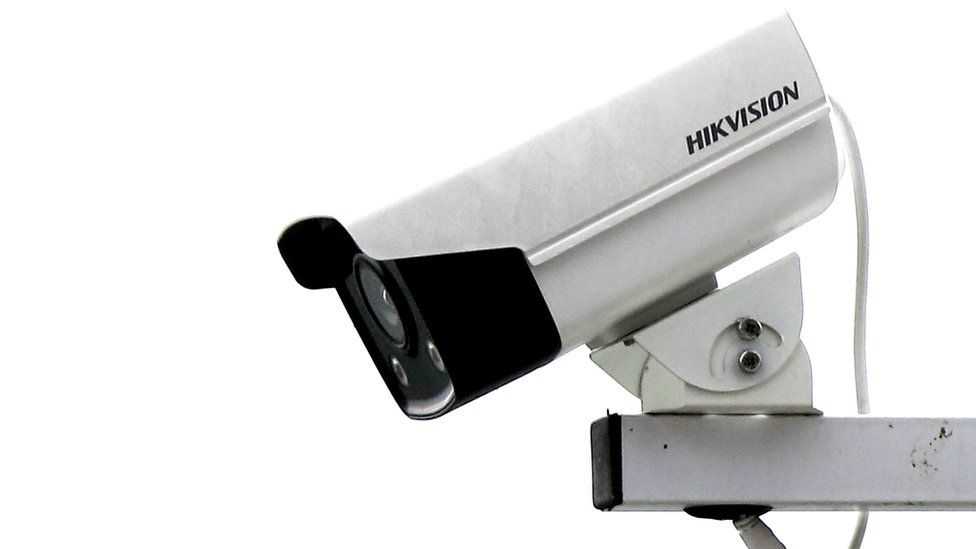Councils and police must 'weigh CCTV firms' human rights records'

Councils and police should consider CCTV firms' human rights records before purchasing, the surveillance camera watchdog has said. Professor Fraser Sampson's call has been backed by Chairman of the Foreign Affairs Committee, Tom Tugendhat MP.
The committee has previously called for a ban on Chinese camera tech it says was used in Uyghur internment camps. But there are doubts the government will add the proposed ethical rule to the CCTV code.
Don't look away
An update to the Surveillance Camera Code of Practice is expected soon - the first update in eight years.
It will set out the rules which police and local authorities in England and Wales are expected to follow when using surveillance cameras. Professor Sampson says the update must require public bodies to think about the ethics of the companies that supply camera technology.
He told the BBC, that at the moment "it is possible to buy camera systems and avert one's eyes from the kind of surveillance operator practices that have been clearly condemned by the Commons foreign affairs committee.
"Looking the other way and simply focusing on the price ignores the ethical cost."
He said "an ethical and socially responsible approach" was needed "where surveillance systems are being bought with public money".
Professor Sampson said it was reasonable to expect suppliers of surveillance tech to behave ethically: "We are exhorting companies to set net-zero carbon targets - is it too much to ask them to set net-zero human rights abuse targets?"
Tom Tugendhat MP told the BBC: "I'm pleased to see the surveillance camera commissioner call for ethical considerations to be included in the camera code.
"The foreign affairs committee has already called for a ban on companies associated with the egregious human rights abuses being committed in Xinjiang. "Those purchasing equipment should consider the ethical and moral cost, not just the price."
On 8 July, the foreign affairs committee published a report which said cameras made by Chinese firm Hikvision "provide the primary camera technology used in the internment camps" and recommended that it "should not be permitted to operate within the UK".
China claims the camps are "re-education" facilities used to combat terrorism.
Hikvision has said it does not oversee or control its devices once they are passed to installers, adding that "operational matters are not within our remit". The firm has called the committee's accusations "unsubstantiated and not underpinned by evidence".
Human Rights
Many local councils use Hikvision's devices, research by Top10VPN found. Samuel Woodhams, who carried out the study, welcomed the commissioner's intervention and said it "must now be followed up with concrete action".
Professor Sampson is pursuing his own inquiries into the foreign affairs committee's allegations against Hikvision,
He told the BBC he was still not satisfied with the firm's answers, and his position remains that he would have expected an "unequivocal response to reports that their practices have been ethically compromised, but that has not been the case".
He says the company offered him a meeting with a senior lawyer- but he declined, as the company said the contents could not be shared with the media or the public.
Hikvision told the BBC it "respects human rights, and strives to uphold the highest standards in every aspect of manufacturing, labour, the supply chain, and end-use.
"Hikvision has always followed the camera code of practice, going above and beyond as leaders in the industry, and we plan to do so in the future."
Significant doubts
Professor Sampson has told the government that the code ought to provide guidance "where there is reason to believe that suppliers or manufacturers have been associated with breaches of international law or human rights abuses".
But people close to the process doubt that this will make it into the rules, the BBC understands.
The Home Office did not reveal what the new code would contain, but told the BBC it supported appropriate police use of technologies like CCTV, adding: "The UK has led international efforts at the UN to hold China to account for its human rights violations in Xinjiang.
"We have also imposed sanctions, including asset freezes and travel bans on senior Chinese government officials, and announced measures to help ensure no UK organisations are complicit in these violations through their supply chains."
The government also pointed out that it was consulting on transferring the surveillance camera commissioner's role to the information commissioner's office - something both Professor Sampson and the current independent reviewer of terrorism legislation oppose.
Tags :
Previous Story
- Chinese auto giant Geely launches electric truck, its...
- Vietnam leads furniture exports, but gap is small
- China's export growth cools; trade surplus hits $84...
- China launches 3 remote sensing satellites into space
- Kaisa Group: Missed payment triggers fresh China property...
- China's domestic sportwear brands rapidly closing on Nike,...
- China’s economy is showing signs of stagflation, economists...
- Yahoo pulls out of China over 'challenging' business...